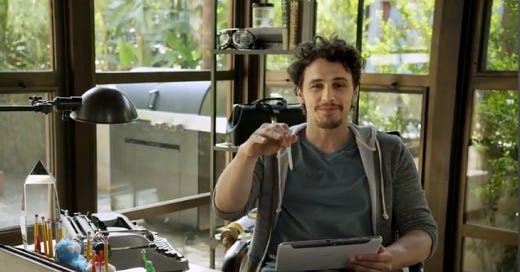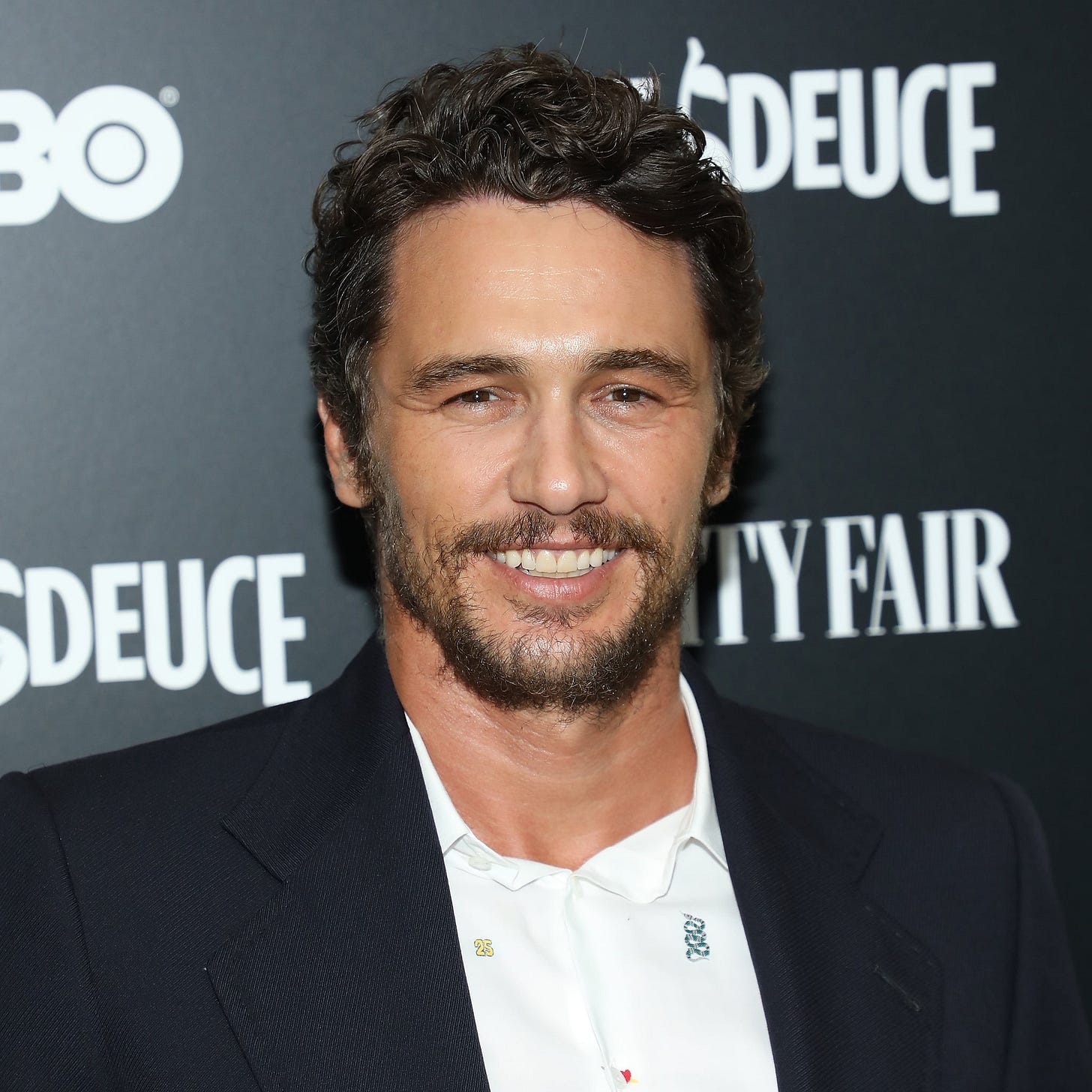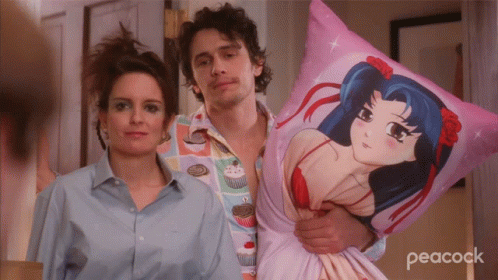All That Glitters: James Franco's Directing Herbert White Isn't Just Bad—It's Dangerous
The actor's 2014 collection of poetry was published by one of the country's foremost small presses, but that credibility can't balance out the book's banal treatment of sexual violence and more.

This is All That Glitters: (Re)appraisals of musicians, actors, and other culture-makers who have published poetry.
All That Glitters is a semi-regular feature of PopPoetry, a poetry and pop culture Substack written by Caitlin Cowan. You can learn more about it here. Check out the archive to see other TV shows, movies, and films whose intersections with poetry I’ve covered. If you like what you read and want it in your inbox, subscribe so you won’t miss a post!
The Preamble
For those who spend any time in the zip codes of contemporary poetry, you know at least some of James Franco’s story.
The actor of Pineapple Express, Milk, and Freaks and Geeks fame creeps around the literary landscape like a neon phantom: too bright to go unnoticed, too translucent to pin down. The author of the novel Actors Anonymous (Little A, 2013), the short story collection Palo Alto (Scribner, 2010), and a memoir-ish tome called A California Childhood (Insight Editions, 2013), among other works, Franco has penned several chapbooks and a collection of poetry that brought him into my little corner of the world, too.
At the 2016 AWP Conference in Los Angeles, I spent an elevator ride up to the roof deck of the Ace Hotel not realizing he was standing next to me. That year (Or was it another? What is time?) little paper masks of his face, glued to tongue depressors, were available to play with on the exhibitor tables of a lit mag I can’t remember. It was a joke—look at me, I’m James Franco: famous poet. He’s one of us, but he isn’t.
Franco’s full-length poetry collection, Directing Herbert White, was published by Graywolf Press, one of the foremost small press publishers of poetry in the world, in 2014. In this collection, we’re able to glimpse a simultaneously self-aware and oblivious man of advantage as he moves through the world that seems to be his birthright.
Page by page, his egotistical, misogynistic speaker slips into and out of the cracks in the facade of someone we understand as James Franco, Famous Person. And while the slipperiness of the poetic speaker can be a tool of liberation for many writers—particularly those historically marginalized and silenced like women, people of color, and LGBTQIA+ writers—Franco’s use of the speaker, persona poems, and shifting points of view help him avoid accountability for the privilege and lack of real introspection that pervade the collection.
The Guy
There are two primary gripes people tend to have with James Franco the Person, and education lies at the root of both.
Though he has been accused of unethical, violent, and predatory behavior before and since, it’s Franco’s now-discredited acting school that sparked the most sexual misconduct allegations against the actor. Founded in 2014, Studio 4 was shuttered after three years when female students came forward and accused Franco, the school’s founder, of inappropriate sexual conduct as a teacher. The stories of Franco’s behavior are disgusting, and Franco admitted to sleeping with his students at the school, cementing its reputation as nothing more than a slick scheme to procure a stable of impressionable young women for the actor and his compatriots to exploit. A settlement in those cases was just reached last year.
Franco’s own educational path has also earned him ire. There was the kerfuffle about a professor allegedly being fired for giving Franco a D in class (a disputed claim, but the professor later sued Franco and lost because he was unable to properly serve him). He was snapped sleeping during a seminar at Columbia1 (which Franco insists was a late-night optional event). And why wouldn’t he sleep? Franco was concurrently enrolled in grad programs at NYU and Columbia while continuing to shoot films.
He also took classes at Brooklyn College, the Rhode Island School, and the low-res program at Warren Wilson, and some of these programs simultaneously. His author bio in Directing Herbert White lists him as holding MFAs from Brooklyn College, Columbia, NYU, RISD, and Warren Wilson, but sources seem to disagree on how many graduate degrees he actually earned versus programs he “attended.”
In a 2016 Rolling Stone article, Jonah Weiner interviewed director David Gordon Green and an unnamed actress who had worked with Franco about his reputation as a “pseudo-intellectual and a fraud,” a characterization they dispute.
Green counters this, recalling that while shooting the 2011 stoner-fantasy comedy Your Highness—by which point Franco had added a Yale literature Ph.D. to his list of goals—“he’d fly out on a Friday to take a test, then fly back the next day, listening to taped lectures in the makeup chair in the morning.”
A prominent actress who worked on a 2012 movie with Franco says that, despite her initial dubiousness, she grew accustomed to the sight of “James on set at 5 a.m., writing essays.” She tells me that the real question when it comes to Franco “isn’t whether or not he’s legit. He’s legit. It’s whether or not he’s insane.”
Insane or not, though Franco eventually earned an MFA or several, his educational foraging does have the tang of academic tourism rather than serious scholarship. But Franco didn’t stop there: he had his sights set on a PhD.
I sat behind James Franco while we both took the GRE in Literature in English Subject Test at NYU in 2010, which used to be required by many English PhD programs for entrance. By far, it was the most grueling and difficult exam I’ve ever taken in my four years of college, two years of my master’s program, and four years of my doctoral program: 230 multiple-choice questions about literature from Beowulf to Toni Morrison. Brutal. In April 2021, ETS rightly discontinued this bewildering behemoth of a test whose mean score was 549 (which means that scoring better than a D+ meant you did better than most test-takers).
That day, Franco turned around and briefly, wordlessly met my gaze just before the test began. He did not look well—bleary-eyed with his hat pulled low. It was a Sunday morning, and I had been out with friends the night before. I wondered if he had, too. During the three hours of the test, Franco was visibly and audibly disturbed. As the minutes ticked by, he sighed loudly again and again, made frustrated noises, and furiously flipped through the test booklet. At the end of the exam period, I saw Franco speaking with the young female proctor at the front of the empty exam room. I wondered if he was attempting to charm her, then chided myself for being so petty.
Out of this immense education came a collection of poetry that I don’t think we would elect to publish after the era of #MeToo.
Though he found this test quite difficult, ostensibly Franco did well enough to satisfy the requirements of the programs he applied to, as did I. Though he would end up enrolling in the PhD program at Yale—and committing himself fairly well there, at least according to one professor—it’s hard to find definitive sources that cite whether or not he actually earned that degree, either.
But this is what you want to hear, right? That celebrities are facile and fickle and incapable of doing things the rest of us folks do? I don’t know whether or not that’s the truth. But the point here is that out of this immense education came a collection of poetry that I don’t think we would elect to publish today, after the era of #MeToo.
The Book
As a self-professed obsessive when it comes to performance art, one has to wonder whether James Franco the Poet is just another performance. But whether or not we’re to take the book as a serious work of art, Franco has managed to rub elbows with many very serious poets in the literary world.
During his time in higher education, Franco studied with poets like Alan Shapiro and Ellen Bryant Voigt, and Frank Bidart, whose violent persona poem, “Herbert White,” inspired Franco to make the short film of the same name that gives his collection of poetry its title.
The collection is filled with poems that read as autobiographical (whether semi- or otherwise) along with persona poems that function like little films Franco is acting in. But by page two, the tone of the collection has been set. It’s dark and sexual, written in an O’Hara-esque voice that has none of Frank’s generosity of spirit and all of Franco’s swagger and self import. “Film Festival” contains these lines:
First I bored everyone And then at the end I put in a shot of my dick And another one with some blood... I also killed a few people. A little film festival just for me.
The banality of violence is everywhere in this collection. And like so many films, much of that violence is sexualized and/or directed at women. In “Chateau Dreams,” a poem that recounts some of Chateau Marmont’s most (in)famous denizens, Franco writes that “In ’54, forty-three-year-old Nick Ray / Fucked fifteen-year-old Natalie Wood in Bungalow 2.” Franco writes of “The poetry of being fucked to death” in “Marlon Brando.”
There is a violence of another kind on display in “Lindsay,” the long persona poem where Franco writes, ostensibly, as Lindsay Lohan. He writes, “fame raped me. / And I raped it, if you know what I’m saying.” It’s unclear to me that someone like Franco has the authority to appropriate the experience of a young woman, or, for that matter, the experience of an economically disadvantaged (and potentially pedophilic) janitor, as he does in “My Place.”
White male poets have been appropriating the experiences and voices of those they should forever, a sour tradition that we apparently still have not unlearned. The narrative impulse is strong, here: in one of the book’s blurbs, Tony Hoagland refers to the content as “stories,” and he isn’t wrong. But the question is whether or not these stories—or that of Sal Mineo, Heath Ledger, and other tragedies of Hollywood—are his to tell.
If this is a performance piece, I am not enjoying my experience.
Franco clearly understands the celebrity book of poems as a chance to know the celebrity, but is there any other impetus here beyond that one? Growing up handsome and successful creates a human being who is fundamentally alien to so many of us, and perhaps even alien to himself. There are moments in this collection when you feel sorry for the speaker of the poems, rich and lonely, at the top but wondering if it’s worth anything, but he relieves you of that duty quickly, time and again.

There are poems that feature rape, sexual acts with animals, casual racism (as in the poem “Fifth Grade,” in which the speaker parrots his black teacher and then whips up an erotic fantasy that involves what feels suspiciously like slave ship imagery) and themes of incest in this collection. And while I’m not attempting to police the content of the book, the attitudes the writer displays towards that content make me feel, in a way, profoundly unsafe.
Maybe if Franco were looking over my shoulder right now, he’d give that winning smile and say “That’s the point.” And if so, it’s not a point I think needs to be made. If this is a performance piece, I am not enjoying my experience.
Even in less overtly offensive poems, the speaker of these poems comes very close to genuine feeling but veers away at the last moment, and you could mistake these swerves into rhetorical distance for deft “open-door” moves, but I think you’d be wrong. For example, in “When My Father Died” the speaker describes himself as “Me, a buffoon in cake-thick makeup” as he receives the bad news. Genuine humility. But the last two lines of the poem, “My father’s spirit released, / As a green light releases an SUV,” are so purposely emotion-avoidant that I almost laughed.
Franco’s poetry refuses to turn back on itself and critique its own evils, choosing instead to shrug at them, to consider them as simply the price of fame.
Perhaps I should have! Is this supposed to be funny? Anne Waldman, in one of the book’s blurbs, praises what she terms Franco’s “wonderful self-reflexive insouciance.” But it’s precisely this apathy toward the darker aspects of Hollywood and of human life that read differently to me today.
The Conclusion
In an interview with Jackie Adams for Los Angeles Magazine, Franco had this to say about his poetry:
Because you’re an actor you receive extra scrutiny when you come out with a book of poetry. How do you handle that?
I’m an English major. I’m working on my Ph.D. in English literature, so this is something that has been a part of my life for a long time. My mother is a poet and a writer. It’s just one of my loves and I went to graduate school for it because I take it very seriously.I know that my life as an actor obviously casts a shadow over what I’m doing with the poetry, but it allows me to get readers that maybe normally wouldn’t read a book of poetry. It also attracts skepticism and contempt prior to investigation, but I can’t think about that. It’s something I love, and if people want to judge my poetry through the lens of my acting then there’s nothing I can do about that.
It’s not just that readers will view the poetry through the lens of his acting. Franco invites them to outright: the opening lines of “Acting Tips” are “When I played Saul / In Pineapple Express / I said, fuck it / Acting should be fun.” And I can tell you that there is plenty of “skepticism and contempt” to be had after an investigation of Directing Herbert White, as well.
Mediocre books of poetry are not a crime, but this book feels like an affront to the ideals poetry holds most dear. Let me offer a final example or two:
The crux of the Bidart poem that inspired Franco’s short film and book comes at its very end, after the speaker has recounted his many violent and unspeakable deeds:
—Hell came when I saw MYSELF... and couldn't stand what I see...
The very first poem in Franco’s book, “Because,” mirrors Bidart’s sentiment:
Years later, I decided to look at what I had made, And I watched myself in all the old movies, and I hated that guy I saw. But he's the one who stayed after I died.
By placing this statement, with all its finality, at the book’s opening, we expect it to be a starting point for further meditation on the self, but it isn’t. By the end of the book, the speaker has made no further epiphanies: he’s just made us “hate” the guy we see more. In the poem “Fake,” Franco fully cloaks himself in plausible deniability, just in case you end up disliking him:
There is a fake version of me And he's the one that writes These poems. He has an attitude and swagger That I don't have. But on he page, this fake me Is the me that speaks. And this fake me is louder Than the real me, and he Is the one that everyone knows. He's become the real me Because everyone treats me Like I'm the fake me.
I don’t want to treat Franco like the “fake” Franco, if there is such a thing. But this book, as a text, strikes me as a dangerous collection to laud. When I say that Directing Herbert White is dangerous, I don’t mean it in a sexy, cool way. I mean that Franco’s poetry is dangerous because it is unrepentant—it refuses to turn back on itself and critique its own evils, choosing instead to shrug at them, to consider them as simply the price of fame. I don’t expect that poets are better people than other folks, but I do expect that poets think harder about the world than most people do.
And Franco’s right: this memoiristic famous-guy poetry does have the potential to draw in new kinds of readers. But the poems those readers are being offered feel as if they take something from you as you read. And on my bookshelf, I only have room for poetry that attempts to give readers something they didn’t even know they needed.





